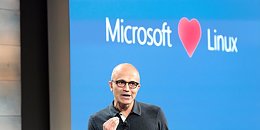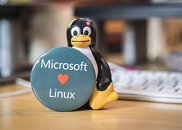Thursday, October 11th 2018

Microsoft Joins the Open Invention Network, Adds 60,000 Patents To Protect Linux and Open Source
Steve Ballmer once said 'Linux is a cancer'. Times have changed a lot, and since Satya Nadella became CEO of Microsoft, Linux and Open Source have become really important for Redmond's company. Azure is based on Linux, for example, and this OS dominates the cloud platform with about half of Azure VMs being Linux ones). Running Linux distributions such as Ubuntu, SuSE or Fedora is also possible natively under Windows 10 through Windows Subsystem for Linux.
The company has made big strategic acquisitions, and Microsoft recently acquired Github, but that approach to Linux and Open Source goes further with the new announcement. Microsoft has joined the Open Invention Network (OIN), a consortium that defines itself as a "shared defensive patent pool with the mission to protect Linux". With that move, Microsoft is bringing 60,000 patents to OIN that will be available royalty-free to anyone who joins the OIN community.OIN has more than 2,650 members (Google, IBM, Red Hat, Sony, Philips, or Facebook are among the biggest ones) and even with the latest moves from Microsoft, this last announcement has surprised many people. Erich Andersen, Microsoft's corporate VP and Chief Intellectual Property Counsel confirmed that idea: "We know Microsoft's decision to join OIN may be viewed as surprising to some; it is no secret that there has been friction in the past between Microsoft and the open-source community over the issue of patents."
The move is a major change for Microsoft, that has been making big moves to transform that relationship with Linux and Open Source in the last five or six years. As Scott Guthrie, another Microsoft executive, told to ZDNet, "at the end of the day, we've shown by our actions that we're serious about open source". OIN's CEO, Keith Bergelt, explained Microsoft's stance: "They aren't trying to sell you something. Microsoft really has been changing. No one's made a longer journey than Microsoft from a proprietary software company to one that lives with Open Source.
Source:
ZDNet
The company has made big strategic acquisitions, and Microsoft recently acquired Github, but that approach to Linux and Open Source goes further with the new announcement. Microsoft has joined the Open Invention Network (OIN), a consortium that defines itself as a "shared defensive patent pool with the mission to protect Linux". With that move, Microsoft is bringing 60,000 patents to OIN that will be available royalty-free to anyone who joins the OIN community.OIN has more than 2,650 members (Google, IBM, Red Hat, Sony, Philips, or Facebook are among the biggest ones) and even with the latest moves from Microsoft, this last announcement has surprised many people. Erich Andersen, Microsoft's corporate VP and Chief Intellectual Property Counsel confirmed that idea: "We know Microsoft's decision to join OIN may be viewed as surprising to some; it is no secret that there has been friction in the past between Microsoft and the open-source community over the issue of patents."
The move is a major change for Microsoft, that has been making big moves to transform that relationship with Linux and Open Source in the last five or six years. As Scott Guthrie, another Microsoft executive, told to ZDNet, "at the end of the day, we've shown by our actions that we're serious about open source". OIN's CEO, Keith Bergelt, explained Microsoft's stance: "They aren't trying to sell you something. Microsoft really has been changing. No one's made a longer journey than Microsoft from a proprietary software company to one that lives with Open Source.


23 Comments on Microsoft Joins the Open Invention Network, Adds 60,000 Patents To Protect Linux and Open Source
I just had some weird thoughts about that.
Jokes aside, although unexpected, it's not unwelcomed.
Big problem there! Linux likes to think they're the only open source operating system out there but they're not. The BSD family is not only a significant presence but uses the BSD software license which is in fact much more open then the GPL that Linux and GNU use. Several times GNU/Linux have actively opposed open source software for allowing the user to "limit their freedom" by using that software on a proprietary platform. The Universal Driver Interface may be the worst example of this. Ever wish you could use the same driver on Windows, Linux, and Mac OS without worrying if it was available for your platform? We could have had a single driver binary that worked across Windows, Linux, BSD you name it, and GNU KILLED IT!
BSD may be able to join OIN, but for a hobbyist OS developer it may as well be closed source. I should point out that lack of drivers is the biggest thing keeping homebrew OS' homebrew, and the reason we are unlikely to see another hobby-to-mainstream OS such as Linux come about. And some (though not mine) are quite worthy.
Too bad it's ecosystem is even worse.. or actually just hand me downs of Linux (regular desktop-wise. Not that it matters for Servers).
It's all semantics to most of us, but GNU has always had a much more... political view of what OSS is.
I view the Stallman ideology much like I view most utopian theories: Nice on paper, but impractical.
They can be very petty, need I remind you. But noted, all the same. :p
In any case, I consider it a sort of tragedy that GNU picked up more than BSD.. but it was a matter of timing (BSD had legal issues at the time Linus developed Linux).
Still, I agree wholeheartedly.
An unfortunate result of the BSD and GPL licenses is that as @StrayKAT has mentioned BSD doesn't require the source code to be published. GPL does and as such a developer can take a BSD project, make a few minor modifications to it, and then publish the whole thing as GPL and cannibalize BSD code. Obviously the BSD guys aren't happy about this. Stallman is essentially a cult leader, and his followers defend his philosophy fervently.
All I want though is the open source world to create something just as good as Mac OS (and free). Maybe even better. Even though I knocked Stallman earlier, the HURD would be pretty sweet.
I do not expect a positive outcome.
Best,
Liquid Cool